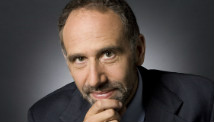STORY HIGHLIGHTS
- Russian President Vladimir Putin has bestowed Russian citizenship on actor Gérard Depardieu
- For Depardieu, a public war of words erupted, with many in France disgusted by his move
- Depardieu more than anyone, represents the Gallic spirit, says Agnes Poirier
- Majority of French people disapprove of his action but can't help loving him, she adds
Agnes Poirier is a French journalist and political analyst who contributes regularly to newspapers, magazines and TV in the UK, U.S., France, Italy. Follow her on Twitter.
Paris (CNN) -- Since the revelation on the front page of daily newspaper Libération, on December 11, with a particularly vicious editorial talking about France's national treasure as a "former genius actor," Gérard Depardieu's departure to Belgium, where he bought a property just a mile from the French border, has deeply divided and saddened France. Even more so since, as we have learnt this week, Russian President Vladimir Putin has bestowed the actor Russian citizenship.
Back in mid-December, the French media operated along political lines: the left-wing press such as Libération couldn't find strong enough words to describe Depardieu's "desertion" while right-wing publications such as Le Figaro, slightly uneasy at the news, preferred to focus on President François Hollande's punishing taxes which allegedly drove throngs of millionaires to seek tax asylum in more fiscally lenient countries such as Belgium or Britain. Le Figaro stopped short of passing moral judgement though. Others like satirical weekly Charlie hebdo, preferred irony. Its cover featured a cartoon of the rather rotund-looking Depardieu in front of a Belgian flag with the headline: "Can Belgium take the world's entire load of cholesterol?" Ouch.
Quickly though, it became quite clear that Depardieu was not treated in the same way as other famous French tax exiles. French actor Alain Delon is a Swiss resident as is crooner-rocker Johnny Halliday, and many other French stars and sportsmen ensure they reside for under six months in France in order to escape being taxed here on their income and capital. Their move has hardly ever been commented on. And they certainly never had to suffer the same infamy.

Agnes Poirier
For Depardieu, a public war of words erupted. It started with the French Prime Minister Jean-Marc Ayrault, and many members of his government, showing their disdain, and talking of Depardieu's "pathetic move." In response the outraged actor penned an open letter to the French PM in which he threatened to give back his French passport.
The backlash was not over. Fellow thespian Phillipe Torreton fired the first salvo against Depardieu in an open letter published in Libération, insulting both Depardieu's protruding physique and lack of patriotism: "So you're leaving the ship France in the middle of a storm? What did you expect, Gérard? You thought we would approve? You expected a medal, an academy award from the economy ministry? (...)We'll get by without you." French actress Catherine Deneuve felt she had to step in to defend Depardieu. In another open letter published by Libération, she evoked the darkest hours of the French revolution. Before flying to Rome to celebrate the New Year, Depardieu gave an interview to Le Monde in which he seemed to be joking about having asked Putin for Russian citizenship. Except, it wasn't a joke.
In truth, French people have felt touched to their core by Depardieu's gesture. He, more than anyone, represents the Gallic spirit. He has been Cyrano, he has been Danton; he, better than most, on screen and off, stands for what it means to be French: passionate, sensitive, theatrical, and grandiose. Ambiguous too, and weak in front of temptations and pleasures.
In truth, French people have felt touched to their core by Depardieu's gesture. He, more than anyone, represents the Gallic spirit
Hugh Miles
For more than two weeks now, #Depardieu has been trending on French Twitter. Surveys have showed France's dilemma: half the French people understand him but there are as many who think that paying one's taxes is a national duty. In other words, a majority of French people disapprove of his action but can't help loving the man.
Putin's move in granting the actor Russian citizenship has exacerbated things. And first of all, it is a blow to Hollande who, it was revealed, had a phone conversation with Depardieu on New Year's Day. The Elysées Palace refused to communicate on the men's exchange. A friend of the actor declared that Depardieu complained about being so reviled by the press and that he was leaving, no matter what.
If, in their hearts, the French don't quite believe Depardieu might one day settle in Moscow and abandon them, they feel deeply saddened by the whole saga. However, with France's former sex symbol Brigitte Bardot declaring that she too might ask Putin for Russian citizenship to protest against the fate of zoo elephants in Lyon, it looks as if the French may prefer to laugh the whole thing off. Proof of this: the last trend on French Twitter is #IWantRussianCitizenship.
The opinions expressed in this commentary are solely those of Agnes Poirier.

 iPhone, iPad and Mac are trademarks of Apple Inc., registered in the U.S. and other countries. App Store is a service mark of Apple Inc.
iPhone, iPad and Mac are trademarks of Apple Inc., registered in the U.S. and other countries. App Store is a service mark of Apple Inc.













